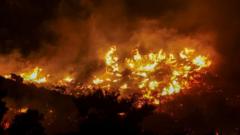The article explores the implications of President Trump's new restrictions on Cuba, emphasizing its impact on the island's economy and the ongoing humanitarian concerns.
Trump Reinforces Cuba Restrictions Amidst Energy Crisis

Trump Reinforces Cuba Restrictions Amidst Energy Crisis
President Trump's latest memorandum tightens US policy on Cuba, particularly regarding tourism and economic transactions.
In a significant policy shift, US President Donald Trump has signed a new memorandum that imposes stricter restrictions on Cuba, aiming to counteract the previous administration's efforts that had relaxed sanctions on the economically challenged nation. According to the White House, the latest measures will enhance the enforcement of existing laws prohibiting American tourists from traveling solely for leisure purposes, while simultaneously rejecting international appeals, including those from the United Nations, to lift the longstanding economic embargo on Cuba.
Cuban Foreign Minister Bruno Rodríguez criticized the memorandum, describing it as a reinforcement of an economic blockade that disproportionately affects the Cuban population, hindering their development and overall welfare. The memo outlines that the US will combat economic practices benefiting the Cuban government and its military while harming the everyday lives of Cuban citizens.
Currently, US travelers are banned from visiting Cuba solely for tourism. Still, they can travel under specific categories such as family visits, educational activities, humanitarian work, and sports. To ensure compliance, the new policy mandates regular audits and requires US travelers to maintain detailed records of travel-related transactions for a minimum of five years. Additionally, business dealings with GAESA, a military-run conglomerate that controls many Cuban hotels, will be prohibited under this memorandum.
Tourism serves as a vital source of income for the Cuban government; however, visitor numbers have dwindled drastically due to severe shortages on the island and frequent nationwide power outages. The memorandum asserts President Trump's commitment to a "free and democratic" Cuba, addressing the deep-rooted struggles under a Communist regime.
This latest policy announcement further extends the measures imposed during Trump’s initial term and reflects a hardline stance that has resonated with the Cuban-American community in the US. Nevertheless, the decision to revoke Temporary Protected Status for Cubans, among others, has sparked considerable discontent among many in that community who had hoped for different immigration policies.
Cuban Foreign Minister Bruno Rodríguez criticized the memorandum, describing it as a reinforcement of an economic blockade that disproportionately affects the Cuban population, hindering their development and overall welfare. The memo outlines that the US will combat economic practices benefiting the Cuban government and its military while harming the everyday lives of Cuban citizens.
Currently, US travelers are banned from visiting Cuba solely for tourism. Still, they can travel under specific categories such as family visits, educational activities, humanitarian work, and sports. To ensure compliance, the new policy mandates regular audits and requires US travelers to maintain detailed records of travel-related transactions for a minimum of five years. Additionally, business dealings with GAESA, a military-run conglomerate that controls many Cuban hotels, will be prohibited under this memorandum.
Tourism serves as a vital source of income for the Cuban government; however, visitor numbers have dwindled drastically due to severe shortages on the island and frequent nationwide power outages. The memorandum asserts President Trump's commitment to a "free and democratic" Cuba, addressing the deep-rooted struggles under a Communist regime.
This latest policy announcement further extends the measures imposed during Trump’s initial term and reflects a hardline stance that has resonated with the Cuban-American community in the US. Nevertheless, the decision to revoke Temporary Protected Status for Cubans, among others, has sparked considerable discontent among many in that community who had hoped for different immigration policies.





















